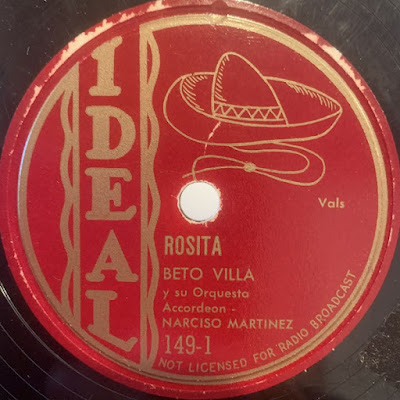Beto Villa ( 26 October, 1915 – 1 November, 1986) was a saxophonist and "father" of the Orquesta Tejana.
Beto was born in Falfurrias, Texas. His father Alberto, Sr., was both a tailor and a musician and strongly encouraged his son to learn to read music. In 1932, while in high school, Beto formed a band called The Sonny Boys, which performed at local festivals and school dances. Four years later, he got his first full-time gig in Freer, Texas, at a dance hall known as the Barn.
For the next several years he played in primarily Anglo dance halls, where he learned to imitate popular American swing bands. Although Villa appeared to be well on his way to establishing a musical career, in 1940 he opened a meat market with his father-in-law. After serving in the United States Navy during World War II (he played in a band for enlisted personnel), he returned to Falfurrias and opened up the Pan American and La Plaza dance halls. While still working in his meat shop, Villa occasionally performed music on the weekends. He soon realized that he could earn more money performing in one weekend than he could working all week as a butcher. So he turned his attention increasingly toward becoming a full-time musician.
By 1946 Villa had developed the idea of merging Mexican-American music and more mainstream popular music by combining the urbanized orquesta with a ranchero style, thereby giving it an arrancherado orquesta sound. In that same year, he approached his friend, Armando Marroquín, founder of the new record company Discos Ideal (Ideal Records), to ask Marroquín to help make a record that would capture the sound of this new musical style Villa had created. The partnership led to Villa's recording of his first singles on a 78 rpm acetate disc, which included a polka entitled "Las Delicias" and a waltz called "¿Porqué te Ríes?"
With broader exposure through these new recordings, Beto Villa y su Orquesta quickly became popular in dance halls throughout South Texas. In 1948 the band scored its first hit, "Rosita." Other hits soon followed, such as "Las Gaviotas,""La Picona,""Tamaulipas," and "Monterrey.""Monterrey," a polka in which Villa teamed up with conjunto accordionist Narciso Martínez, demonstrated Villa's musical versatility and determination to blend together a variety of musical styles.
By 1950 Villa's band had grown to include as many as twelve members at a time, capable of handling a broad range of instrumental combinations, as well as more complex musical arrangements. In trying to make his orquesta more sophisticated than rival bands, he went so far as to fire members who did not learn to read music. For a period of twelve years, Beto Villa y su Orquesta toured throughout the United States, recorded more than a hundred singles on 78 rpm, and produced over a dozen LPs for Disco Ideal. Villa also recorded ranchera singles with Lydia Mendoza and the duo Carmen y Laura.
In 1960 Villa stopped touring because of health problems. During his career, he created a new musical style for Mexican Americans, the orquesta Tejana, which helped them express both their ranchero (country) and jaitón (cosmopolitan) identities. In 1983, three years before his death, Villa was inducted into the TMA Hall of Fame. He died in Corpus Christi on November 1, 1986. In 2000 he was an inaugural inductee into the Tejano R.O.O.T.S. Hall of Fame.(Edited from Texas State Historical Association)





.jpg)